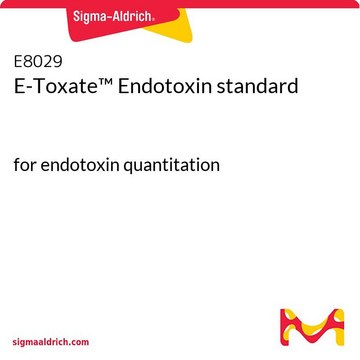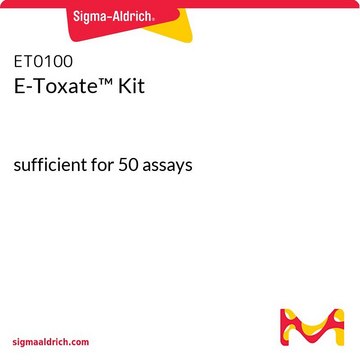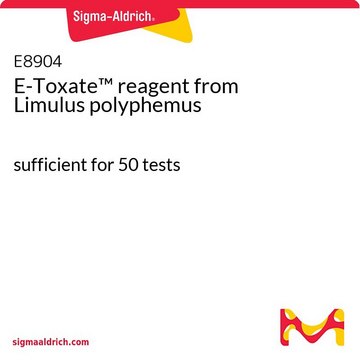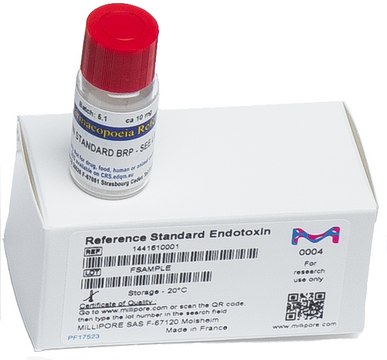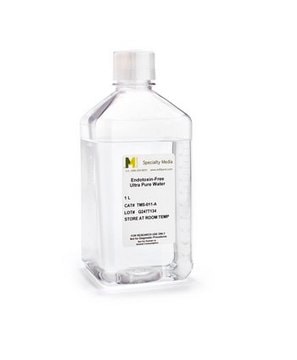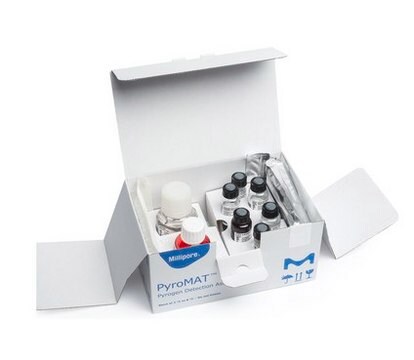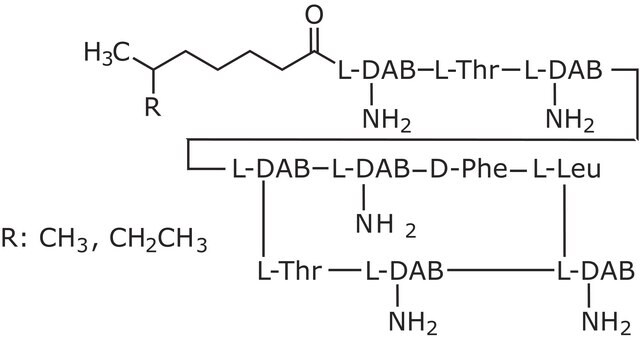ET0200
E-TOXATE™ Kit
sufficient for 20 assays
Synonym(s):
Endotoxin detection kit
Sign Into View Organizational & Contract Pricing
All Photos(1)
About This Item
UNSPSC Code:
12352202
NACRES:
NA.84
Recommended Products
usage
sufficient for 20 assays
storage temp.
2-8°C
General description
E-Toxate™ Kit prepared from Limulus polyphemus amebocyte lysate (LAL) is suitable for the detection and quantification of endotoxins for research purposes.
Application
E-Toxate™ Kit has been used to determine the endotoxins:
- from Tabebuia chrysantha and Tabebuia rosea plant methanolic extracts
- from human pentameric C-reactive protein (pCRP)
- in the Diptheria toxin preparations
The E-TOXATE Kit was used to determine the number of bacteria in suspensions of group B streptococci used to infect rats for models of sepsis.
Features and Benefits
- Highly sensitive to endotoxins
- Simple and rapid detection
- Cost-effective
Legal Information
E-Toxate is a trademark of Sigma-Aldrich Co. LLC
comparable product
Product No.
Description
Pricing
related product
Product No.
Description
Pricing
Storage Class Code
12 - Non Combustible Liquids
Certificates of Analysis (COA)
Search for Certificates of Analysis (COA) by entering the products Lot/Batch Number. Lot and Batch Numbers can be found on a product’s label following the words ‘Lot’ or ‘Batch’.
Already Own This Product?
Find documentation for the products that you have recently purchased in the Document Library.
Customers Also Viewed
Priscila Raquel Martins et al.
Memorias do Instituto Oswaldo Cruz, 103(3), 244-250 (2008-06-12)
A polysaccharide-rich fraction (ATF) of medicinal mushroom Agaricus brasiliensis was evaluated on the candidacidal activity, H2O2 and nitric oxide (NO) production, and expression of mannose receptors by murine peritoneal macrophages. Mice received three intraperitoneal (i.p.) injections of ATF and after
Priscila Raquel Martins et al.
The journal of venomous animals and toxins including tropical diseases, 23, 17-17 (2017-03-28)
Agaricus brasiliensis is a medicinal mushroom with immunomodulatory and antitumor activities attributed to the β-glucans presented in the polysaccharide fraction of its fruiting body. Since β-glucans enhance cellular immunoresponsiveness, in this study we aimed to evaluate the effect of an
G Teti et al.
Infection and immunity, 61(1), 227-235 (1993-01-01)
Cytokines are suspected of playing an important role in the pathophysiology of septic shock. This study was undertaken to determine whether tumor necrosis factor alpha (TNF-alpha) induces the production of other cytokines and mediates mortality in a neonatal rat model
Anne Kiang et al.
Molecular therapy : the journal of the American Society of Gene Therapy, 14(4), 588-598 (2006-05-31)
Excessive complement activation can result in extreme tissue damage and systemic inflammatory responses, similar to innate immune responses rapidly elicited after systemic adenovirus (Ad) injections. To determine if Ad interactions with the complement system impact upon Ad-induced innate immune responses
Svenja Sladek et al.
Drug delivery and translational research, 8(5), 1421-1435 (2018-06-28)
Polyelectrolyte nanoparticle constructs (NPs) comprising salmon calcitonin (sCT), chitosan (CS), and hyaluronic acid (HA) were previously established as having anti-inflammatory potential when injected via the intra-articular (i.a.) route to a mouse model. We attempted to translate the formulation to a
Our team of scientists has experience in all areas of research including Life Science, Material Science, Chemical Synthesis, Chromatography, Analytical and many others.
Contact Technical Service